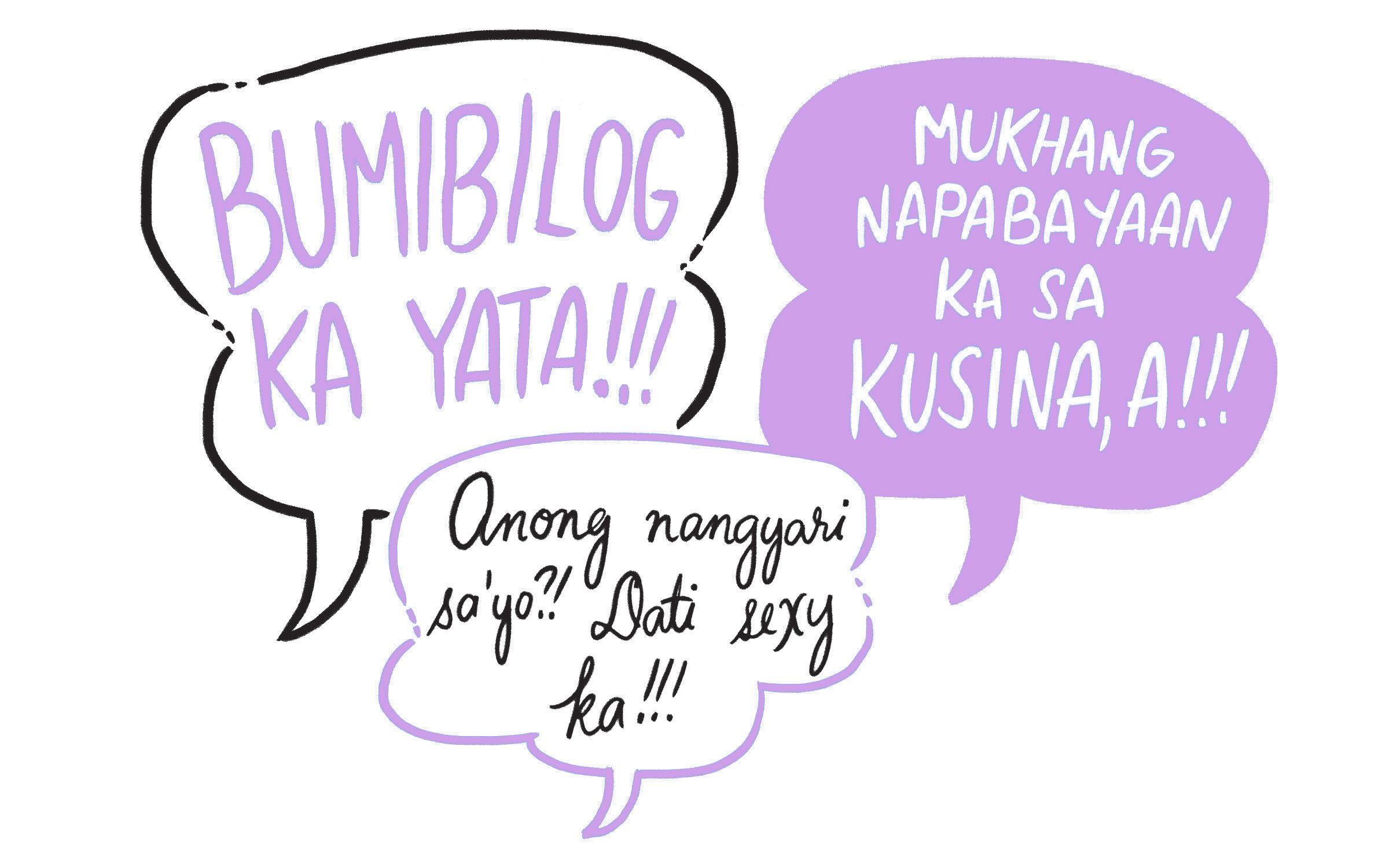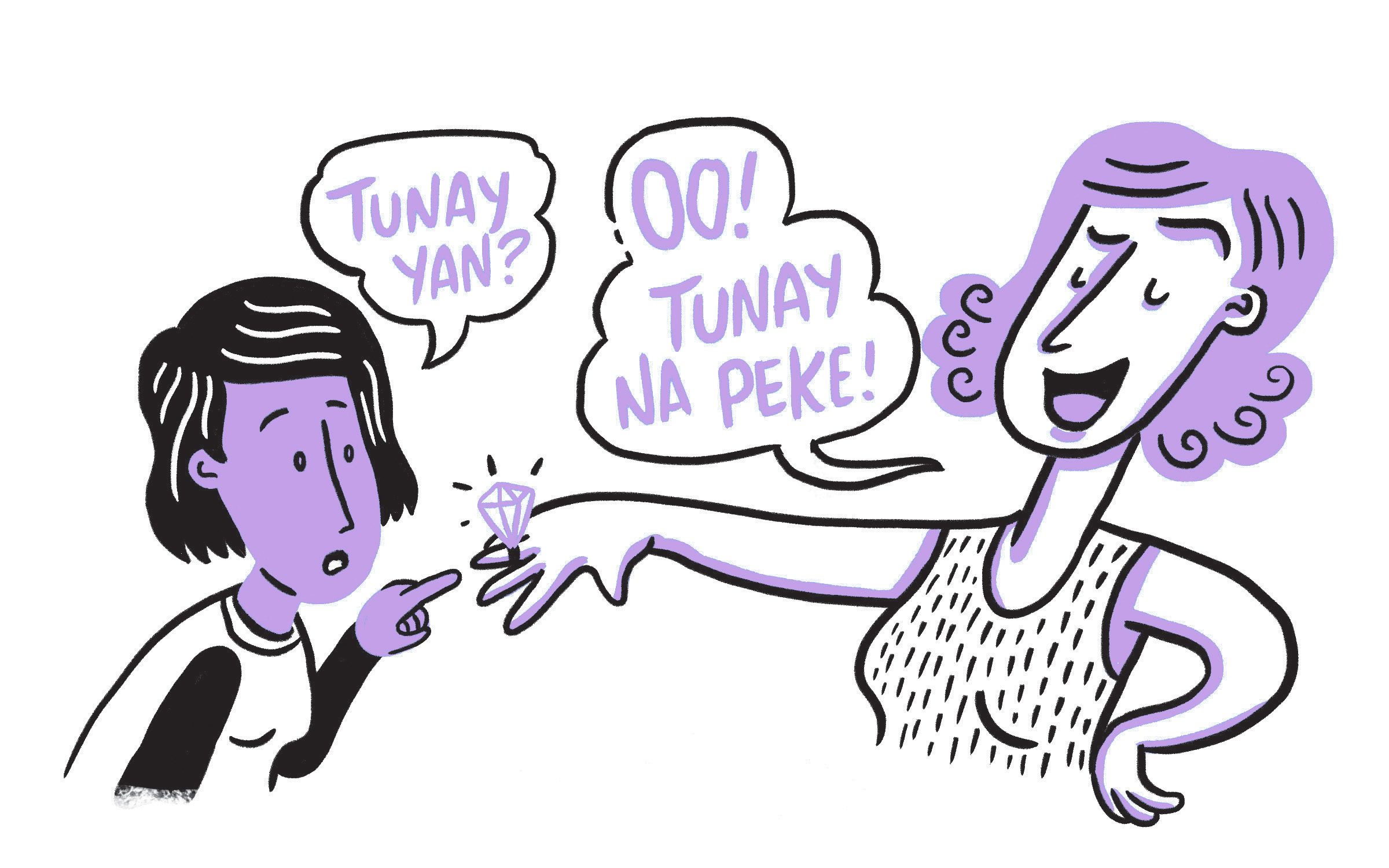SUMMARY
This is AI generated summarization, which may have errors. For context, always refer to the full article.
![[Part 1] ‘Parang tumaba ka!’: Rise above these 3 awkward situations](https://www.rappler.com/tachyon/r3-assets/0B45ADC6686F41F58E44460CE82218F2/img/E549DD7EA9AB4545B80A4CF226B95DFA/IMG_0040-scaled.jpg)
Editor’s Note: The following is an excerpt from Pinoy Manners: A Modern Guide To Delicadeza For All Generations by Joy Buensalido, Buensalido Public Relations president & CEO. Click here to find out how you can get your copy. Illustrations by Pushpin Visual Solutions
Ideas for Pinoy Manners came to me in trickles as the business of everyday living would bring about little things that would annoy, irritate, or cause me to feel flustered or upset such as when dealing with business associates, colleagues, family and friends, and people whom I relate to in general.
I have carved a career in public relations and part of my personal advocacy is to constantly project everything that’s positive, and to be optimistic about life. I know this may be difficult to do, especially when one encounters seemingly insurmountable challenges, but I believe that with faith and an unwavering trust in God, it is easier to hurdle the negative aspects.

And that is what I hope this simple book will help its readers with.
A disclaimer
I have divided these rules [in the book] into several topics according to common situations we encounter in our everyday lives.
But I also have to say this as a “disclaimer”: the rules in this guide are not absolute; there will be those who would disagree with some or all of these, according to their personal beliefs. So let this be just one woman’s set of opinions, expressed in the form of a practical guide that simply aims to enhance readers’ personal, social, and professional interactions with others.
Of weight gain and weight loss

When you meet friends you haven’t seen for a long time and notice changes in their size, weight or appearance, please refrain from blurting out tactless or unpleasant remarks like, “Hoy, ang taba mo ngayon, a!” (Translation: “You look fat now!” or “You’ve gained so much weight!”).
Other variants of this negative statement: “Bumibilog ka yata!” (“You are getting plumpish!”); “Anong nangyari sa iyo? Dati sexy ka!” (“What happened to you? You used to be sexy!”); and (often said in jest) “Mukhang napabayaan ka sa kusina, a!” (“Looks like you’ve been hanging out in your kitchen!”)
The flipside of this situation would be pointing out, aloud at times, “Ang payat mo ngayon!” (“You are so thin!”) While a lot of women might feel flattered by this comment, it may unnerve a few who may consider it as a snide remark. After all, calling attention to their weight loss, especially if they have been trying to fill in or gain a few pounds, or worse, if they are secretly battling or struggling with some kind of health issue, may be offensive or hurtful to them.
A popular personality was once visibly bothered when a friend who had not seen her for a while greeted her with, “You look tired!” She didn’t quite know whether this was an indication of concern on her friend’s part or if the latter was, indeed, telling her that she looked terrible.
The next time you’re tempted to exclaim, “You’re incredibly thin! What did you do?” to someone who has lost considerable weight, simply remember the rule of thumb: “When in doubt, don’t!” Just zip it or if you can’t help it, simply say, “You look good!” or “You’re blooming!”
Good friends may reveal that they’ve started going to the gym or taken up a recent diet—or relate the fact that they’ve been sick or are suffering from a health problem—which may have caused the drastic drop in weight.
But when such a disclosure is not made, the best option will always be not to comment, at all.
Don’t ask someone what or who they’re wearing . . .
I was having lunch with some friends at a hotel when the general manager stopped over at our table. In the course of the small talk that ensued, a member of our group couldn’t resist telling him: “I love your tie! I would love to get one for my husband . . . where did you get it?”
The GM (a foreigner) appeared flustered and didn’t quite know how to reply so he slightly turned his back on us to check his tie, even stepping away a few meters to scrutinize the label.
“It’s Gucci,” he half-whispered later. I felt a tad relieved for him that it was a brand worth announcing.
This, however, leads us to the issue: Is it proper to ask people—publicly or privately—what or who they’re wearing?

Yes, if you’re in a celebrity-studded affair or red carpet event where high-profile guests like socialites, fashion industry stalwarts, and movie and television stars expect to be asked what and who they’re wearing—and be photographed in them.
In any other setting, it would be prudent to keep your chutzpah in check and remember the admonition: “When in doubt, don’t.”
. . . or how much they got it for
Even worse than being nosey about brands and labels is asking someone how much they paid for something they’re wearing. Unless you are extremely close to the person, never ever bring up the subject of costs and prices.

Similar to the tacky habit of asking about brand names and prices is a uniquely Filipino predilection for asking, “Totoo ba yan?” (Is that real?) when they see a friend or acquaintance brandishing a signature bag or wearing expensive-looking jewelry.
“Totoo ba yan?” can stem from real curiosity and, therefore, no malice might be intended. Still, it would be sensible to refrain from asking a question that casts doubts about someone’s capacity to afford pricey possessions—or hints at the wearer’s taste for knock-offs.
This rule can change if you’re close enough to the person concerned. But if you don’t want to embarrass your friend, please ask her quietly or secretly and, again, not within hearing distance of other people.
Keep quiet when you have nothing good or positive to say. Please refrain from making comments about someone’s looks unless your remark will make him or her feel good. People are especially sensitive when they have weight issues. Thus, exclaiming, “Why have you lost so much weight?” or the reverse, “How did you get so big!” can be hurtful to them.
On the other hand, when someone you know seems to look better or younger than when you last saw her, avoid saying “Did you have a nose job?” or “Nagpa-botox ka ba?” Better to say “You’re looking good”—but only if you mean it. Otherwise, just keep quiet.
Delicadeza’s not dead
Filipinos can be the warmest, most joyful people in the world. We are known for our ready smiles and the way we cheerfully welcome those we meet for the first time. In fact, ours is a special brand of exuberance that is rarely found in any other part of the world.
Small wonder that Filipinos are the “third happiest people in Asia,” according to the Happiness Index assessed by innovation firm Eden Strategy Institute, in 2013.
“In the Philippines, happiness comes from a sense of large, extended families and the predominantly Catholic Pinoys have a predisposition to look for the best in everyone,” Eden said. The report further claimed that “Filipinos are taught from young to support the underdog, find joy in hard work, and smile at hardships.”
Still, having an exceptionally cheerful disposition does not ensure that one would comport himself or herself in a manner that shows consideration to others. I am confident, though, that delicadeza is not dead among Pinoys.
With this book, I hope to demonstrate how a sense of delicadeza works in various situations in everyday life, and how a lack of it can result in soured social and personal relationships. And believe me, having delicadeza has absolutely little to do with one’s social class and stature in life. – Rappler.com
Add a comment
How does this make you feel?
There are no comments yet. Add your comment to start the conversation.